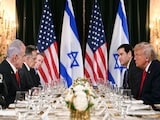- S Jaishankar highlighted the need for a global workforce amid labour shortages in many countries
- Trump claims new $100,000 fee on H-1B visas targets alleged abuse of the programme by low-paid foreign workers
- India has the world's largest overseas population, with about 35.4 million NRIs and persons of Indian origin
In what seemed like a direct jab at US President Donald Trump's new H-1B visa diktat, Foreign Minister S Jaishankar underscored the importance of a global workforce, stressing that local populations of many nations cannot meet their labour demands and depend on migrants for the same.
Mr Jaishankar's comments come amid India's trade and tariff challenges with the US, as Trump's hardline approach to immigration, including a new $100,000 fee on H-1B visas, continues to affect Indian professionals who make up the majority of beneficiaries of these temporary work visas in America.
In his order, Trump has claimed that the H-1B program has been 'deliberately exploited' to replace US workers with lower-paid foreign labour, mostly Indians, and pose a "national security risk". He justified the unprecedented fee as a way to curb what he called 'systemic abuse'.
What Jaishankar Said
Addressing the event 'At the Heart of Development: Aid, Trade, and Technology' hosted by the Observer Research Foundation (ORF) on the margins of the UN General Assembly session on Wednesday, Jaishankar called for the creation of a more acceptable, contemporary, efficient model of a global workforce.
"Where that global workforce is to be housed and located may be a matter of political debate. But there's no getting away. If you look at demand and you look at demographics, demands cannot be met in many countries purely out of national demographics," he said.
"This is a reality. You cannot run away from this reality. So how do we create a more acceptable, contemporary, efficient model of a global workforce, which is then located in a distributed, global workplace? I think this is a very big question today that the international economy has to address."
The Foreign Minister said that technology, trade, connectivity and workplace-wise, "we are going to end up in a very different world in a very short term." In today's "very turbulent" atmosphere, it is important particularly for large countries to build capacities to be more self-reliant, he said, asserting that it is "very much" the focus in India.
India's Global Workforce
Every year, an estimated 2.5 million (25 lakh) Indians immigrate overseas, making India the country with the highest annual number of emigrants in the world. India also has the world's largest overseas population, with approximately 35.4 million non-resident Indians (NRIs) and persons of Indian origin (PIOs), per the Foreign Ministry's May 2025 data.
In the US alone, tech firms rely heavily on H-1B and similar visas to hire engineers, scientists and coders from overseas, particularly India. Indian immigrants have dominated the H-1B programme in recent years, making up more than 70 per cent of the recipients.
Today, Indian-origin executives run some of the top US firms, including Google, Microsoft and IBM, while Indian doctors make up nearly 6 per cent of the US physician workforce.
The new $100,000 H-1B visa fee imposed by Trump, on top of already existing hefty filing and legal costs, risks leaving the skilled worker migration programme expensive and unviable for both applicants and employers, especially for migrants from lower-income backgrounds.















